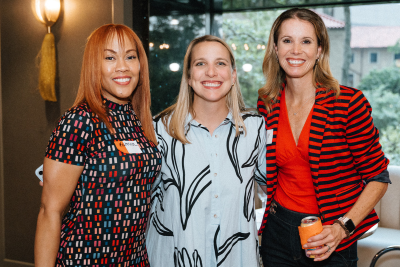In March of 2024, The Chronical of Evidence-Based Mentoring highlighted Step Up's model of Flash Mentorship. Read the full article for more on this model that's distinctive to Step Up.
Researchers have theorized about different types of social networks, and the need for a balance between so-called “bonding” and “bridging” social capital. Bonding capital involve relationships with close family and friends who are relatively similar in terms of race and social class, while bridging ties involve a broader network of relationships with people like teachers, guidance counselors, coaches, college faculty and staff, and employers who can serve as a bridge to upward mobility.
Unfortunately marginalized youth tend to have less access to bridging capital than their more privileged peers. To address this, a growing number of innovative programs have emerged that successfully expand networks. The approaches involve both teaching youth to “fish” for mentors (i.e., to recruit mentors) and “stocking the pond” (i.e., expanding the availability of high-social capital adults in marginalized youth’s lives). The National Guard Youth Challenge Program, for example, is an intensive quasi-military program for adolescents who have dropped out of high school, has successfully deployed the youth-initiated mentoring approach.
In Connected Futures, an extension of this approach, high school and college students are provided with the strategies and skills to cultivate a network of supportive adults, rather than a single mentoring relationship. Compared to incoming college students who were provided only with information, incoming students who were assigned to a four-session intervention in which they learned how to recruit faculty and staff support had stronger ties with faculty members, higher grade-point averages, and less help avoidance at the end of their freshman year. Other networking approaches help students choose an non-kin adult to attend skill-building workshops with them (Hurd et al., 2018) or help to connect youth who are aging out of (or at risk of entering) the foster care system (Greeson et al., 2019). Most recently, researchers have shown that suicidal youth who learned to recruit caring adults had lower levels of mortality nearly fifteen years later than their counterparts who did not (King et al., 2019).
Stocking the Pond
Of course, the onus for locating and recruiting mentors need not rest solely with youth. Marginalized students, even those who are trained in mentor recruitment, may struggle to find bridging capital in thier networks. Moreover, not every potential mentor is up for a long-term commitment. Such adults could play a more time-limited form of bridging capital.
Flash mentoring
Mentoring software platforms that include “flash mentoring” features are well-positioned to connect mentors, such as local employers, retirees, or alumni who are willing to offer less intensive connections. One excellent example, is Step Up’s Digital Community, which connects caring adults with girls and women for short-term advice and information sharing sessions. Youth can search for and connect with interest-aligned mentors who are trained to provide effective, time-limited support. Such approaches have implications for expanding youth’s access to new relationships and opportunities.
Article courtesy of The Chronicle of Evidence-Based Mentoring.




